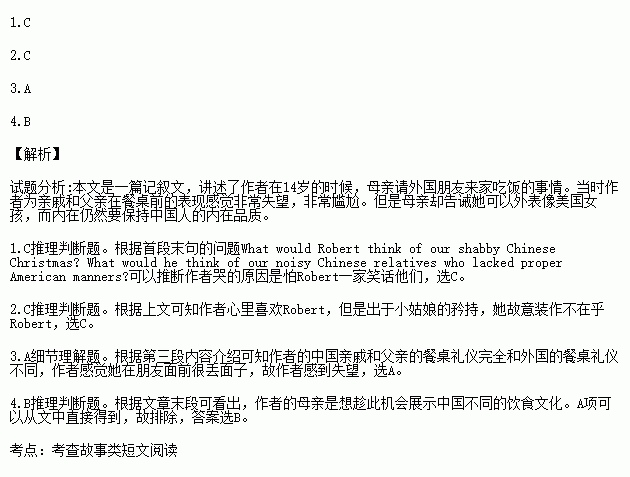题目内容
I fell in love with the minister's son the winter I turned fourteen. He was not Chinese. For Christmas I prayed for the boy, Robert. When I found out that my parents had invited the minister's family over for Christmas Eve dinner, I cried in panic. What would Robert think of our shabby Chinese Christmas? What would he think of our noisy Chinese relatives who lacked proper American manners?
On Christmas Eve, my mother created abundant Chinese food. And then they arrived—the minister's family and all my relatives. Robert greeted hello, and I pretended he was not worthy of existence.
Dinner threw me deeper into disappointment. My relatives licked (舔) the ends of their chopsticks and reached across the table. Robert and his family waited patiently for a large plate to be passed to them. My relatives murmured with pleasure when my mother brought out the whole steamed fish. Robert made a face. Then my father reached his chopsticks just below the fish eye and picked out the soft meat. “Amy, your favorite,” he said, offering me the tender fish cheek. I wanted to disappear.
At the end of the meal, my father leaned back and burped (打嗝) loudly, thanking my mother for her fine cooking. “It's a polite Chinese custom to show you are satisfied,” explained my father to our astonished guests. Robert was looking down at his plate with a reddish face. The minister managed to bring up a quiet burp. I was shocked into silence for the rest of the night.
After everyone had gone, my mother said to me, “You want to be the same as American girls on the outside.” She handed me an early gift. It was a miniskirt. “But inside you must always be Chinese. You must be proud that you are different. Your only shame is to have shame.”
It was not until years later that I was able to fully appreciate her lesson and the purpose behind her particular menu. For Christmas Eve that year, she had chosen excellent Chinese food.
1. When the writer found out the minister's family would come for Christmas Eve dinner, she cried mainly because ________.
A. she worried about their shabby Chinese Christmas
B. she worried about their Chinese relatives lacking American manners
C. she worried about being laughed at
D. she worried about meeting the minister's family
2.What does “he was not worthy of existence” probably mean? It means ________.
A. he should not exist
B. he was worthless
C. the writer was not interested in his existence
D. the writer expected his coming
3. The dinner threw the writer deeper into disappointment mainly because ________.
A. she childishly expected all of them to act in the same way as Americans did at table
B. her father reached his chopsticks to pick fish for her
C. her father leaned back and burped loudly
D. her relatives licked the ends of their chopsticks
4.We can infer from the passage that ________.
A. the writer appreciated her mother's lesson years later
B. the mother prepared to show Chinese different food culture
C. the writer must be proud that she is different
D. the minister's family really enjoyed the food

